
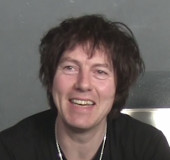
 © Copyright 2013 Rock Interviews dot com, Photos :
Rock-Interviews.com.
© Copyright 2013 Rock Interviews dot com, Photos :
Rock-Interviews.com.


 © Copyright 2013 Rock Interviews dot com, Photos :
Rock-Interviews.com.
© Copyright 2013 Rock Interviews dot com, Photos :
Rock-Interviews.com.


Interview - Jim Jones Revue
Thursday 06th June 2013
Le Transbordeur (Lyon)
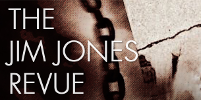
|
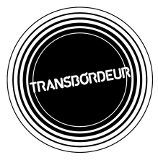
|
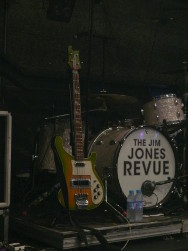
Jim : Jim Jones Revue.
AM : You are a garage rock and roll band.
Jim : Yeah, rock and roll. Garage rock and roll says something
very definite, you know. We like that, but we like lots of
other stuff too. It's not just, that sounds like it's a niche.
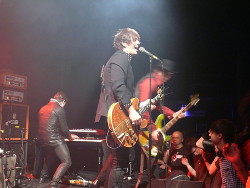
Rupert : Exciting and energetic.
Jim : Explosive and honest.
Henri : Aggressive and intense.
Jim : Free and easy, freeandeasy.com!
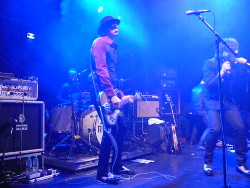
Jim : Henri is like, easily, the best boogie-woogie player in London,
possibly in Britain. What would you say?
Henri : I would say that is love, the boogie-woogie player spell. (smiling)
Jim : He is being modest, I think we have got the best guy.
Rupert : The best guy for us. He has got those traditional chops,
but he has also got a Punk rock attack as well.
Jim : And he is opened to a kind of messing with the format. He takes
things apart, put them back together, Frankenstein style, a bit from
here and a bit from there. Usually people that could play to that
level are very pure about what they want to do and they don't like
to experiment, but Henri was the other way round. He was sick of
this kind of purist attitude, he really wants to figure out a kind
of new direction to take the sound.
Henri : It's more than just, we might call traditional blues piano, it's
very into rock and roll more than anything else, and it doesn't sit
very well with the purist mentality.
AM : OK. Where are you from?
Rupert : London.
Jim : London.
Henri : I am from London but I was born in Harfleur in Normandy.
I am half-French.
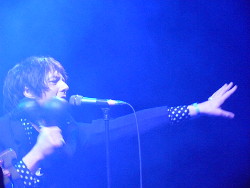
AM : So you are bilingual.
Henri : Oui moitié français, moitié anglais.
AM : Where and how did you meet?
Rupert : I met Henri through the small adds section of the
Evening Standard when I was looking for pianists.
Jim : I met Rupert when I was night surfing on freeandeasy.com,
(all laughing). He was the only other person online at the time!
This is destiny. Do you play guitar by any chance? We got together
around a club in London music scene and Rupert was promoting some
of the coolest music shows. He was bringing over Blues guys from
the Mississippi and the deep South to play in London.
They were the kind of shows I wanted to see and we got to
know each others.
Rupert : I knew Jim from his previous band
Thee Hypnotics, because I
knew a couple of the guys in Thee Hypnotics, but I didn't actually
know Jim, so our paths converged.
Henri : My first meet with Rupert was over the phone when I was asked
to do my first tour with the band. He asked me if I had any experience
of touring. I said about a week on the road, so he said, how do you
feel about 52 days? I thought it was great, I always wanted to do that.
Jim : It was great for us because our previous piano player left
the band because we were playing too many live shows, and he didn't
like to be away from home, so, for Henri to say yeah, was a big result.
Rupert : The thing about the Jim Jones Revue especially when
it started, having a piano player, playing that kind of music,
the kind of style he did, was completely unique, so when he
left it was kind of nerve-wracking, we thought we wouldn't
find someone to replace him.
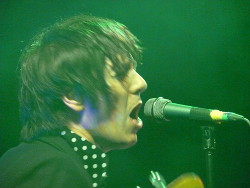
Henri :
Jerry Lee Lewis,
Little Richard,
Chuck Berry.
I would spend hours listening to Jerry Lee Lewis.
Rupert : Still then!
Henri : I think, even when I was very young, I used to listen
to that when I was a child. Also film soundtracks,
Ennio Morricone,
John Barry and
John Williams.
It pretty much stayed that way until I started to listen to a bit of
jazz and blues, when I was a bit older. When I joined this
band I discovered more music like
Iggy and the Stooges,
Sex Pistols,
and so on, which was very exciting. It is still
a new territory for me, because I have been listening to that
stuff maybe two or three years now, but I have been listening to
Jerry Lee Lewis for twenty years.
AM : What about you Jim?
I think I became switched on to rock and roll when I was very young. By the time I was a teenager, myself and a group of friends, I guess we were going through that whole period of, do you know the book Please Kill Me by Legs McNeil?
AM : Not read yet.
Rupert : It's about Punk rock.
Jim : Yes it's like the history. Basically it covers all the bands
which were the proto-Punk bands, before Punk Rock and the original
kind of ethos about being very individual before Punk Rock became
like a fashion. This was about people expressing themselves
as artists. All those groups, Stooges, The
MC5,
The New York Dolls, on and on to
The Cramps. I guess it
was a period where musically the charts music and everything
was really shit, so you would look to the underground music,
there were bands like The Birthday Party, The Cramps, and
The Gun Club, and so on. So during my teenage years that was
really what was been absorbed by my mind.
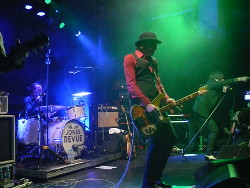
AM : Rupert?
The musical path I have followed strangely echoes Jim's even if
we didn't know each others at that time.
Jim : We went to the same concerts without knowing each others.
Rupert : And when we got to know each others years later, I said,
you went to that gig, you saw that, I was there too.
It was really nice because some people I knew never got what
I was talking about, so it was great that Jim shared some
of my experiences. The first guitarist I saw that inspired
me to play the guitar was the second band I saw. It was
Johnny Ramone
of the Ramones. He was just like that,
slap a power, you see him with his simplistic style but
actually if you break it down what they do, it's quite complex
to create that sound. And then I also like
Steve Jones,
Mick Jones
and all the Punk Rock stuff. Then I started to get
more into Blues,
Muddy Waters,
Howlin' Wolf
and rock and roll with for instance
Cliff Gallup. Then in the eighties,
Rowland Stuart Howard
from the Birthday Party, I thought he
was incredible. In the nineties I let into things like
Jon Spencer,
Judah Bauer,
Fat Possum
stuff like,
Junior Kimbrough,
Kenny Brown
is fantastic. Then I ended up working with those
people when I started my club night, booking them to play in
the venue I was working at, and that's where I met Jim.
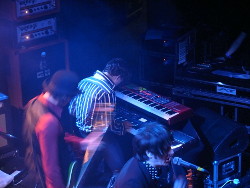
Rupert : I think it's six years ago.
Jim : Six years, jesus!
Rupert : We were here, in this venue, four years ago, with
Placebo.
I remember that because it was a kind of breakfree for us,
because we have gone free from just playing small tiny little
shows in the UK and things were started to build for us in France.
Jim : La tournée de la Musicale.
Rupert : We played three or four dates around France, and one of
them was in this venue. We also went to the
Olympia in Paris, which was very exciting.
AM : A mythic venue.
Rupert : I mean to play the Olympia and also to play in New York,
various venues in London, it's astonishing.
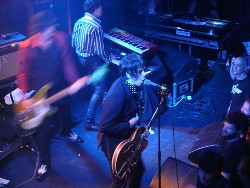
Jim : Three proper albums, and one other album which is singles,
they were previously downloads.
Rupert : We didn't do anything on vinyle. We wanted to put a
compilation together to be available for someone to play as an
album or a CD, you know physically.
AM : Your latest album is here and it is called The Savage Heart.
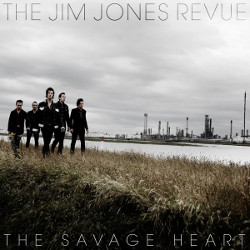 Jim : Here it is.
Jim : Here it is.
Rupert : It is available on freeandeasy.com (smiling)
AM : So let's talk about this album. How many tracks?
Jim : Nine tracks.
Rupert : There are nine tracks on there, but actually during the
recording sessions we ended up to sixteen. We stripped it down to
what we thought was to be kept.
Jim : We try to make it like a journey, so musically it's like a
journey in the same way that this cover represents, like a personal
journey of the mind or like an actual physical journey going somewhere.
Rupert : What we didn't know at the time is that we shot this in
Canvey Island, where
Dr Feelgood
are from. We like this darkness
of the landscape. What we didn't know is, that it is the same
landscape of Le Havre in north of France, so we have got lots of
fans in Le Havre who said, oh my god you went to Le Havre to shoot it,
and we said no, it's in Essex in England, but it's the same landscape.
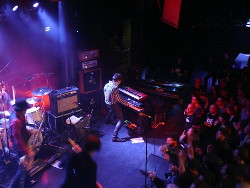
Henri : In and Out of Harm's Way, which is a track from the album.
Jim : It's the sixth track.
Henri : First track of the second side. I remember I had a great
time recording it, because I've got to play on this enormous
grand piano to record the piano part. It was different to anything
I have ever done before. Jim was saying about a journey, speaking
about the album, this song is as well about a journey.
It's kind of mysterious, very dark number, and I enjoy playing it live.
AM : What about this one Jim?
Jim : Catastrophe. Track seven. A great chance to use the
B3 Organ
that was in the studio and has got a particular sound. It's one of
the song that just came out of the clouds and straight into my head
and I just played it. Rupert got a great sound using a
Telecaster on that one.
Rupert : Yeah.
Jim : We haven't play it for a while. I am trying to remember what
else is on Catastrophe. The guy who mixed the album,
Jim Abbiss,
this song was the first one he worked on because he listened to all
the tracks from the studio and he said, I want to start with
Catastrophe because I understand that groove straight away.
Good little tune!
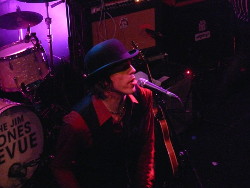
Rupert : It's Gotta Be About Me. It was the first single of
the record. I think it was the second or the third song of the
album that we have written when we first start to write new
lyrics for the album. It's quite an early track. It's a real
bluster. It's got all the elements of the Jim Jones Revue in
one song, but it also moves in on and as it's the first song
of the album it's like a real statement of intent, meaning here
we go, this is what this record is going to be like. It goes off
in different directions. A fantastic heavy groove, heavy piano,
sleazy and base instinct kind of song. It's a good one and I like
the guitar solo.
AM : Me too! This is for you Henri.
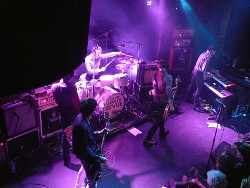 Henri : Chain Gang. I recorded this song on grand piano. It's a number
that I always like to play live, we play it a lot live. Again,
we used the organ on this as well, and have a ghost note which is
a single note played through out the whole song. Who is that guy
you said that used it a lot?
Henri : Chain Gang. I recorded this song on grand piano. It's a number
that I always like to play live, we play it a lot live. Again,
we used the organ on this as well, and have a ghost note which is
a single note played through out the whole song. Who is that guy
you said that used it a lot?
Jim : Spooner Oldham
Henri : He used that a lot on different songs. You can only hear
it if you are looking for it, on some of his records. Jim Jones Revue
is based around the idea of a release of a deep old Chain Gang top
Blues number, especially on the piano, I've looked at a guy called
Otis Spann
for inspiration, he was Muddy Waters piano player.
He used to use a lot of really low notes on the piano. It took a
lot of time to figure out a motif for the low notes when we were
writing that. It's got a pace of its own, can speed up or slow down
a bit and Jim leads it with the vocals, he can stretch it out and we
just go with Jim's vocals. It's never really the same, we never play
it the same way twice.
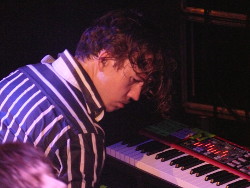
I think it could be my favourite song from the album. We had some
other tracks that we were working on, at the time, and one song in
particular had a great groove, but as a song it never took off into
anything solid. I tried to work on ideas to find another part,
like a medley or something like that, to breathe more life into it.
Still wasn't quite working but then, the part we were trying to use
to jack this other song up, took on a life of its own and within overnight
it just became this own song. All the lyrics land in almost from a dream.
I love the sound of this track. Henri was using a really industrial sound
on the organ. The song is about not just voyeurism, although there is an
element of that, but also this whole thing you know like the
George Orwell
Big Brother, and just the way the world is now, where there are surveillance
cameras everywhere, on every corner and everybody is being watched.
And also the quantum physics things about how particules if you observe them
change their behaviour. It just makes you think about the role of the
observer and how that changes things happening, even if it's unknown,
it makes a difference. I thought they were great ideas to tie in together
lyrically. We were aiming to do a song that was more experimental, and at
the end of the day came out more like a Howlin' Wolf kind of Blues number,
then any Blues things I've intended to do in the past, but at the same time
it sounds fresh, because we try to push it into a new area. I think all of
our influences just played through into the music, even though Henri is
using a note that was supposed to reflect the industrial concrete landscape
with surveillance cameras, it sounds like it has got this earthy kind of Blues,
kind of river flowing through the middle of it. I was really pleased with the
way that came out, I think it stands up as a strong emotion, a theatrical
element and I think it is strong imagery.
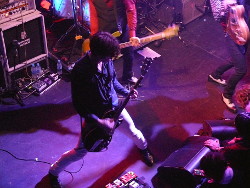
I think this is the first song that came out of the new writing session.
It was kind of just a statement, just to sum up what was happening economically
all over the Europe. Up until 2007 everything was supposed to be going through
this boom that would never end, and suddenly we are all poor, no one has got
any money, everything is falling apart. We've been going on tour, we start
with one recession, then we come back from tour like six months later, it's a
double deep recession, then we come back again another twelve months later,
it's a triple deep recession and the Euro crashes. What happened? where did
the money go? Who is to blame for it?
Henri : Merci. Never Let You Go. This is a very powerful number, and I enjoy to
play it live, always really cool to play. Jim was talking about Albert Ammons before.
There is a piano intro which is very influenced by
Albert Ammons. You think it can
go somewhere and suddenly it goes somewhere completely different. It's got some
really cool guitar there from Rupert.
Rupert : Oh thanks Henri! There was a tribal thing that ran through this album,
not in a contrive way like we try to make a concept record. We just felt what happens
when you strip back, the kind of life, the layers of civilization we have,
it's supposedly the Western one. What happens when it falls apart. Really serious
riots happened in the area where we live in London, you see it's not much and it
takes a few bottles and bricks to be frightened. Everything just falls apart and goes
into chaos. It's like where that savagery comes from? It's like a twenty first century
tribalism. We were messing around with certain ideas and this song came out.
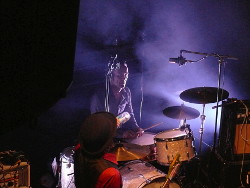
It started of an idea, a tune that I had. When we were working on it Rupert
thought that it would sound good if we played it like a gospel.
We were imagining guitars but we stripped it back to see how the voices would
sound, and it sounded good already, so it seemed like no point to go any further,
and put any guitars on it. Lyrically it's an interesting song, 7 Times Around the Sun,
is seven years. It takes a year to go around the sun so if you go seven times it's
seven years. There was a time in my past when I had issues with drugs and addiction
and that kind of things and this song is about the coming out of that, the revelation
of being reborn on the other side, which tied in really nice with this gospel idea,
like a revelation, being reborn and redemption, finding a new way, in challenging
your energy in a different way, it's quite a personal statement. It's great to play
it live for people, the first few times we played it, the guitars were put down and
there were just vocals with the piano and Henri does this great boogie-wooggie.
We worked on deconstructing that, so it was the most kind of simplified.
We worked on how much can you take away, like Shakespeare used to say, you leave
a bit more to the imagination of the listener, they put their own images onto it,
it's got a lot of strength that way. When we were working on the album, we wanted
to push ourselves in new directions, just try everything and we thought as long as
it has some intensity and some emotion, it works for us, we want to get away from
any preconceived ideas, it has to be this or that, like the classic rock and roll.
We try to go away from that, keep the spirit of it, but push it somewhere new and
exciting, something that have more of our own personality.
So that's 7 Times Around the Sun.
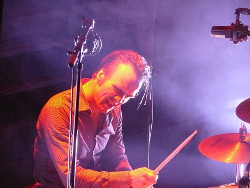
This is an interesting number. We were in the middle of recording the record.
We've done the pre-production and we were just about to go in the studio and in
between times we had like two-week dates in the UK, I think we might done some
in France as well, and we were road testing a lot of the new stuff.
Jim kept playing this song all the time by the Flamingos called
I Only Have Eyes For You, it's like
dreamlight, kind of soporific. He was playing it all the time,
we've been speaking to Nick Lowe who came down to one of our sessions and
help us on some pre-production, he said everything sounds great but have
you ever thought of doing something completely different? I was thinking
why don't we try something like this, then Jim and Henri start working on
it together. Then when we were doing the first track in the studio, messing
around in between texts, and by the time we got to do the second session,
they had the rudiments of the song worked out, which is pretty much what you
hear on this, just strip back to piano and vocals, and I thought it might be a
good idea just to cover the whole thing in feedback. It's a combination of these
things but it's really based around Henri and Jim's vocals. It's a high point of
the album because it went in a direction that no one would have predicted that
we would do and it's a kind of very special song.
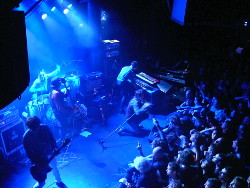
Jim : Great, fantastic.
Rupert : It was really good.
Jim : We went on, just the right time, everyone has a few drinks, the sun
has gone down and we were ready to rock. The crowd was surfing.
Rupert : Lots of energy.
Henri : You are normally told within a few seconds if it's going to be a
great gig and it was definitely one of the really great gigs.
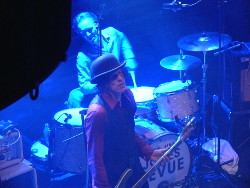
Rupert : I don't think there are any! Ok, it might be a heavy rock band or a metal band, louder.
Jim :
Kevin Shields maybe.
Rupert : Yeah, maybe My Bloddy Valentine. Not that we do this as a kind of competition,
but the people we work with, they say, there is no one who can come closer in terms of volume.
Jim : We don't even try to be loud, we really aren't! If our drummer could go quieter
we'll bring it down a bit, but you can only turn a drum down, Nick can't hit any lighter.
Rupert : I tell you a funny story. The first time we ever played together, me and Jim,
it was just me, Jim and Nick, the drummer. Up on to that point, I have always been the
loudest in any band, and the other guys said turn down you're too loud, anyway,
Jim came in and he has his guitar in his hand and his Twin over his shoulder and he
came and plugged it and he was louder than me! It wasn't an intentional thing.
The louder on stage is Henri because he plays keyboards, all bands have a keyboard player,
back to the stage, and he's got a tiny little lamp and everything is really polite.
Henri has got two half-stacks, two keyboards, he's got more firepower on stage than
some French venues has got with their whole PA. It's true.
AM : So have a nice gig tonight.
All of them : Thank you very much.
AM : In Le Transbordeur venue in Lyon. We wish you the best and thank you very
much for your time guys, it was a pleasure to meet you.
Jim : Keep on rockin'
AM : Yeah, we will.
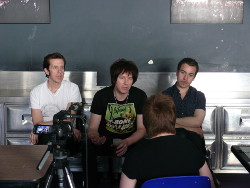
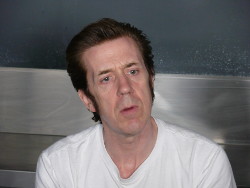
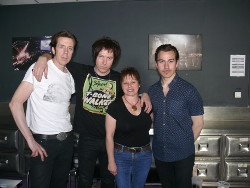
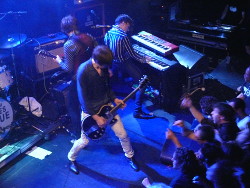
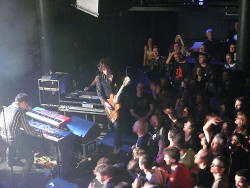
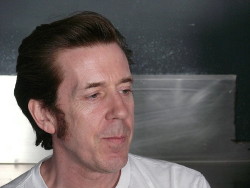
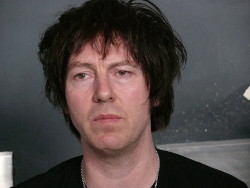
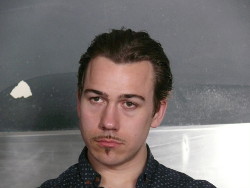
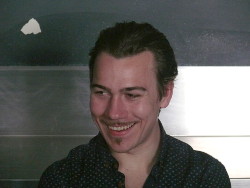

|

|